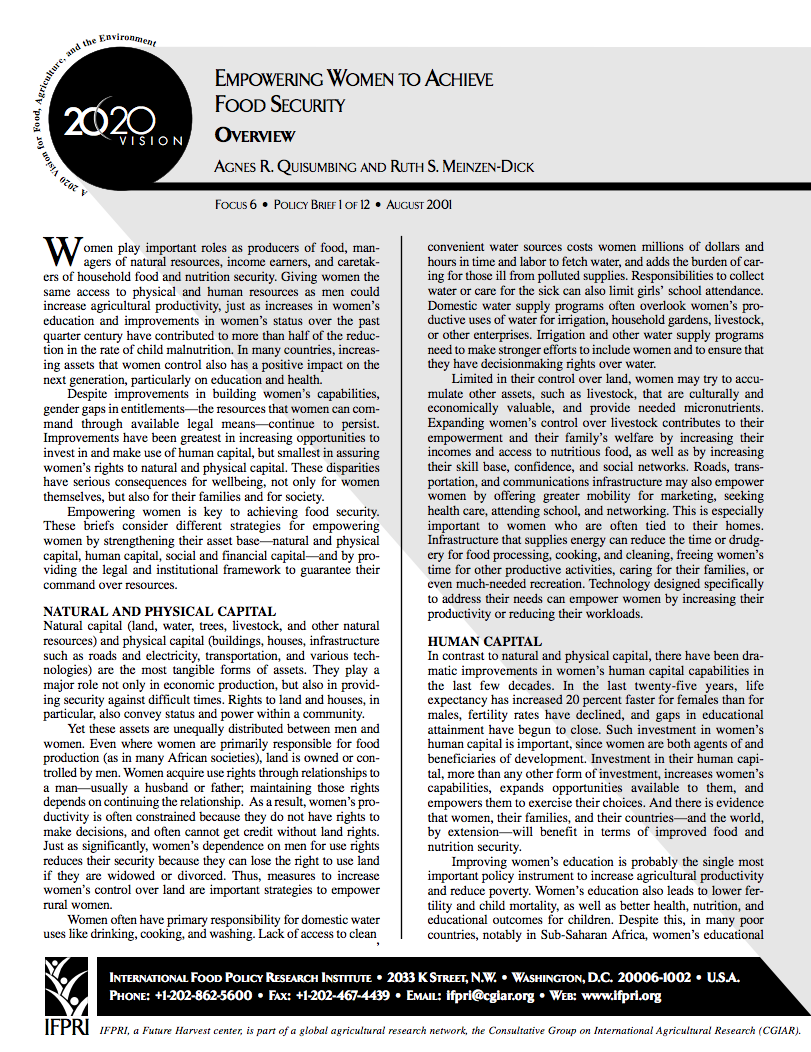Land, trees, and women
This research report examines three questions that are central to IFPRI research: How do property-rights institutions affect efficiency and equity? How are resources allocated within households? Why does this matter from a policy perspective? As part of a larger multicountry study on property rights to land and trees, this study focuses on the evolution from customary land tenure with communal ownership toward individualized rights, and how this shift affects women and men differently.This study’s key contribution is its multilevel econometric analysis of efficiency and equity issues.
Contested Terrain: Oxfam, Gender, and the Aftermath of War
The topic of gender relations in the context of conflict covers highly sensitive terrain, not only within the war-torn society, but for intervening institutions. Like other international humanitarian agencies, Oxfam Great Britain (GB) has faced difficult questions about whether its presence has sometimes done more harm than good. External agencies also have to ask themselves whether their interventions impact negatively on women and gender relations.
Communique of the Southern African Regional Conference on Farm Workers’ Human Rights and Security
Delegates at the Harare conference on farm workers in Southern Africa noted with concern the continued marginalisation of farm worker communities and made recommendations on: weak labour legislation, citizenship rights, basic human rights, women farm workers/dwellers, HIV/AIDS, child labour and child abuse, globalization, debt cancellation, xenophobia, farm workers and land reform, the need for a regional summit.
Land Reform: still a Goal worth Pursuing for Rural Women?
Asks whether land reform is still a goal worth pursuing for rural women. Includes gender and land reform; changing livelihoods and de-agrarianisation; insecurities; land tenure and land titling; limitations to land; arguments for landholding; a few policy and practical initiatives; conflicts over land and property. Concludes that, despite all the problems outlined, land reform for rural women is worth pursuing since, among other things, it would lessen the risks of hunger and malnutrition and also provide links to rights in other spheres.
Empowering women to achieve food security
Women play important roles as producers of food, managers of natural resources, income earners, and caretakers of household food and nutrition security. Giving women the same access to physical and human resources as men could increase agricultural productivity, just as increases in women’s education and improvements in women’s status over the past quarter century have contributed to more than half of the reduction in the rate of child malnutrition.
Trade Liberalization: Impacts on African Women
Trade liberalisation processes impact differently on men and women due to the fact that men and women have different roles in production. Despite the fact that women are actively involved in international trade, WTO agreements are gender blind and as such have adverse impacts on women. The General Agreement in Trade and Service (GATS), for instance, provides for a level playing field in service provision between big foreign owned companies and small locally owned companies.
Rural Women to fight for their Right to Land
The Commission for Gender Equality has put land restitution programme at the top of its agenda for the gender summit in August. Cites paper by Dr Funiwe Jaiyesimi-Njobe saying the big problem is that land is usually allocated to groups headed by males. Women and communities are too often viewed as homogeneous groups. Calls for encouragement of a critical mass of women entrepreneurs in rural areas. Also cites Samantha Hargreaves of the National Land Committee saying women are usually excluded from restitution programme and are unlikely to be represented on CBOs.
What Land Reform has meant and could mean to Farm Workers in South Africa
Covers introduction, farm workers in South Africa, tenure security for farm workers with a focus on ESTA – including the justice system, farmers’ responses and women farm workers; equity share schemes; rural housing and land redistribution; lessons to and from South Africa.
Women’s Access to Land in Rwanda
Closing statement from workshop on culture, practice and law: women’s access to land in Rwanda. Contains recommendations on the marriage problem, the inheritance law, land scarcity and population growth, the land policy and the bill, the environment, discrimination.
Gender and Citizenship: Learning from South Africa?
In what ways does political transformation mean a change in meanings and practice of citizenship - in the relationships between individuals and the state? This paper discusses the experiences of women, particularly black women, of citizenship in South Africa, where the new administration promised a new politics based on civil society and universal citizenship.






